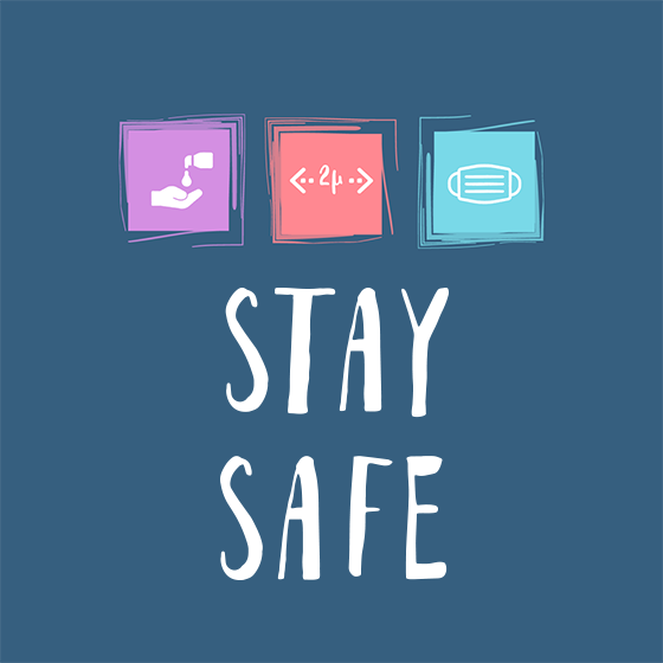|
During the first wave of the Covid-19 pandemic, Greece has timely taken all necessary measures that effectively slowed down its spread in the country. The government plan for dealing with the disease’s new surge is assessed and updated on the basis of the daily epidemiological data. Greek authorities ask people to maintain a physical distance from others as best they can. The use of a face mask is obligatory on public transport means, taxis, elevators, hospitals, when visiting government services buildings, in shops and other commercial establishments. People should also avoid overcrowding at all times, in indoor as well as in outdoor spaces.
During your stay in areas with a local COVID-19 transmission you should: - Postpone your trip if you have a fever and/or respiratory symptoms, such as cough or shortness of breath. - Cover your mouth and your nose with a tissue or with your elbow (not with your hands) when coughing or sneezing. - Avoid any contact with other people if you have a fever and/or respiratory symptoms such as cough or shortness of breath. After your return trip from areas with a local COVID-19 transmission: - Stay alert for any symptoms of illness for the following 14 days. - In case you run a fever and/or have respiratory symptoms, such as shortness of breath or a cough, 14 days after your return trip, you are advised to stay at home and seek immediate medical care. Make sure you mention all the details about your recent trip. You can also contact the National Public Health Organisation in Greece (1135, 210-5212054). See the Travel Notices at the National Public Health Organisation website, here. See also the advice to incoming travellers provided by the General Secretariat for Civil Protection, here. I WANT TO TRAVEL TO GREECE. CAN I? By AIR: By October 25th, 2020, the following restrictions apply: - Non-EU citizens / residents are not allowed to enter Greece. Exceptions apply to citizens / residents of Australia, Canada, Georgia, Japan, New Zealand, Rwanda, South Korea, Thailand, Tunisia, Uruguay, and the United Arab Emirates; upon arrival, travellers will be subject to random testing. - Eleftherios Venizelos Athens International Airport will be the only one serving flights from/to Albania and North Macedonia. - Passengers of flights from Bulgaria, Romania, Hungary, Poland, the Czech Republic, the United Arab Emirates, Malta, Belgium, Spain, Albania, North Macedonia, and Israel will be required to produce a negative molecular test (PCR) for COVID-19, performed up to 72 hours before their entry to Greece. The test results must be issued by an accredited medical laboratory of the country of origin, in the English language, mentioning the passenger’s identification (passport / identity card). Random testing will also take place at entrance checkpoints. Up to 10,000 Israeli residents per week are allowed to enter the country at any Greek airport. - Flights to/from Turkey and to/from Catalonia, Spain remain suspended. Until October 25th, 2020 (incl.) travellers arriving from Russia will have to show a negative molecular test (PCR) for COVID-19, taken up to 72 hours before their entry to Greece. Russian residents will be subject to random testing upon entering the country. Flights from Russia can arrive at the airports of Athens, Thessaloniki and Heraklion, Crete, and a limit of 500 per week applies to incoming travellers. Protocol for passengers arriving by air See more info here. LAND: Land border arrivals from Bulgaria are allowed through Promachonas border station. Entry from other border stations with Bulgaria is allowed for essential travel. With regards to Albania, North Macedonia and Turkey, entry is allowed for essential travel. All travellers entering the Promachonas border station are obliged to present a negative molecular test (PCR) taken within 72 hours before their arrival. Protocol for passengers arriving by land More information at https://travel.gov.gr/#/ SEA: Arrivals by sea are allowed only at Corfu, Patras and Igoumenitsa ports. Protocol for passengers arriving by sea More information at https://travel.gov.gr/#/ As of August 1st, cruise ships are allowed to dock at Piraeus, Rhodes, Heraklion Crete, Volos, Corfu and Katakolo harbours (as Ports of Entry). They can then sail to any other Greek harbour. In accordance with the EU Healthy Gateways, Greek authorities will supervise the implementation of the necessary hygiene measures, as adapted to Greek Law and local conditions. Questions & Answers: Do I have to take a medical test to enter Greece? Will I be placed on a 14-day quarantine when I arrive? Visitors arriving by air, land or sea, may have to take a random test upon arrival. After being tested, they will proceed to their final destination and they will have to self-isolate for 24 hours. In the event of a positive result, they will be contacted and placed on a 14-day quarantine, with the expenses covered by the Greek state. Travellers entering the Promachonas border station are obliged to present a negative molecular test taken within 72 hours before their arrival. Can a visitor provide the results of a molecular test (conducted up to 72 hours prior to arrival) to avoid being tested? Random testing is part of the entrance procedure. Travellers entering the Promachonas border station are obliged to produce a negative molecular test taken within 72 hours before their arrival. Are hotels open? Yes. As of June 15, all tourist accommodation establishments have reopened, in compliance with the health protocols in place. What about entertainment? Are restaurants, cafés, bars, archaeological sites and beaches open? Restaurants, cafés, bars, amusement parks, spas, open air cinemas, some festival and other cultural event venues, archaeological sites, museums and beaches are open; visitors must comply with the health protocols in place. Can I travel within Greece by train, bus, plane or ferry? Yes, you can travel within the country by train, bus, plane or boat. Are there any general rules I need to know in advance about the use of public transport (metro, buses, trolleybuses) and taxis? The use of face coverings is mandatory on all public transport (metro, buses, trolleybuses etc.) and taxis. A fine is imposed for not wearing a face covering. Taxis/minibuses of 5 and 7 seats or private vehicles/minibuses can only carry up to 3 passengers. Minibuses of 8 and 9 seats can carry up to 5 passengers. The above restriction does not apply to parents with minors. To travel by intercity buses, touring coaches and trains, the use of a face covering is mandatory. Vehicles operate at 65% of their seating capacity. To travel by ferry, passengers are required to fill in a questionnaire, have their temperature screened, wear a face mask in all areas (indoors and outdoors) and maintain a physical distance from other passengers everywhere on board. Ferry boats with cabins sail at 85% of their capacity, while vessels without cabins and speedboats at 80% of their capacity. Passengers should practice physical distancing while getting on and off the boat. Only two individual persons are allowed per cabin, except for families or people with disabilities and their carer (up to 4 persons). USE OF A FACE MASK/ FACE COVERING COMPULSORY* IN: Planes Boats (indoor and outdoor spaces) Trains Metro Railway System Buses / Trolleybuses Taxis / Minivans Museums Churches and other worship areas Hospitals / Consulting Rooms / Diagnostic Services Providers Banks Government agency buildings visited by the public Shops Super Markets / Food Shops (baker’s, butcher’s, fish monger’s, confectioner’s etc) Hair Salons / Beauty Parlours Elevators In indoor as well as outdoor spaces on Lesvos, Zante, Kythnos, and Mykonos Islands, and in the regions of Halkidiki, Chania, Heraklion, Pella, Pieria, Imathia, Trikala, Kilkis, Achaia, Ioannina, and Kozani. In the Attica region, it is mandatory to wear a mask in outdoor spaces where people may gather, such as squares, bus stops, queues at shop entrances etc. *A 150€ fine will be payable for not wearing a mask. Boarding boats or planes is not allowed without wearing a mask. RECOMMENDED IN: Archaeological sites Restaurants Bars / Clubs Cinemas / Theatres (in Attica, the use of masks is obligatory on the premises) HOW SAFE WILL I BE IN GREECE?
ACCOMMODATION Tourist accommodation establishment managers are required to create an action plan, to have a health protocol in place for each part of the establishment and be ready to deal with a potential Covid-19 case, in accordance with the current guidelines of the National Public Health Organisation (e.g. hotel quarantine area). More information at: visitgreece.gr/en/home/health_protocols_ DINING As per government instructions, tables are arranged so that customers maintain a safe distance among them. There is 2 m2 of outdoor space available for each customer and 2.2 m2 of space available per person indoors. The staff are required to wear a mask or face shield, and customers are advised to do the same. Customers are not allowed to remain standing in night clubs, bars, live music venues, restaurants, cafes, etc. Until October 12th, 2020: Night clubs, restaurants, bars etc. close at midnight in the following regions: Attica (including the islands in the Saronic Gulf and Kythira Island); Thessaloniki and environs; Halkidiki; Pella; Pieria; Imathia; Kilkis (and environs); Larisa (and environs); Trikala (and environs); Karditsa (and environs); Volos, Achaia, Ioannina (and environs), and Kozani (and environs). Same rules apply to the following islands: Crete; Corfu (including nearby Othonoi, Ereikoussa and Mathraki Islets); Mykonos; Santorini; Paros; Antiparos; Kos; Rhodes; Lesvos; Zante; and Kythnos. Up to 4 customers are allowed per table and up to six if they are 1st degree relatives. CULTURE / ENTERTAINMENT Archaeological sites and museums allow for a limited number of visitors to enter per hour, and a procedure must be followed when entering and leaving. A mandatory health protection protocol is in place for those entering cultural events venues, amusement parks and beaches. The use of masks and hand sanitisers is recommended, as well as keeping a physical distance. Museum visitors are required to wear face masks. Open-air cinemas operate at 75% capacity. Films are screened without an intermission and canteens remain open throughout the screening so as to avoid overcrowding. Every two or four seats there is a vacant one. Health protection rules are to be followed on the premises; customers should maintain a physical distance at the ticket booth and prefer contactless card payments. Pre-purchase of an e-ticket is also recommended, where available. Until October 12th no concerts, live performances (theatre, dance, etc) are allowed to take place in the Attica region. The ban also extends to film screenings in indoor cinemas. Open air cinemas will operate at 60% capacity and viewers will be required to wear a mask. |
AuthorGreece Adventure Trips Blog. Best insiders tips and info for your trip to Greece! Archives
July 2021
Categories
All
|
We Would Love to Have You Visit Soon!We live & work in Athens GMT +2 timezone
10:00 am - 6:00 pm |
©
Greece Adventure Trips
|



 RSS Feed
RSS Feed

